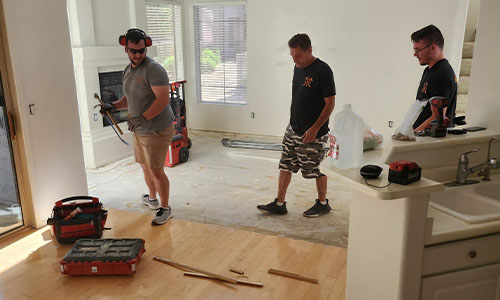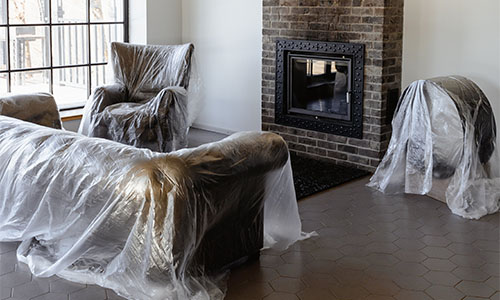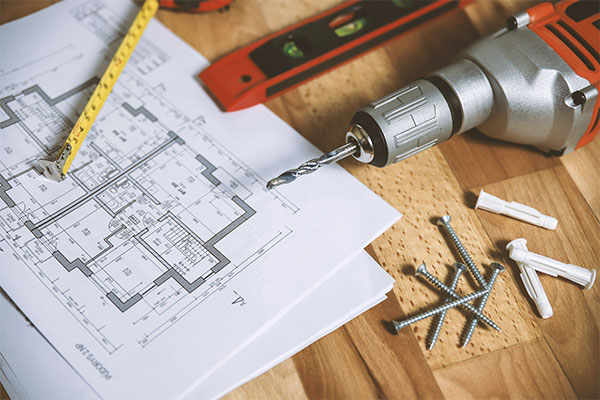Create a Plan for Remodeling Success!
Are you wondering what you need to do to prepare for a home remodel? To ensure everything goes as smoothly as possible, we’ve put together a list of essential tips to help you prepare your home for an upcoming remodeling adventure. From organizing your space to safeguarding valuables, these simple steps will set the stage for a hassle-free and rewarding renovation experience. Let’s dive into these helpful pointers to get your home primed for a great remodel!
#1 Set a Clearly Defined Budget

One of the most crucial steps before diving into a remodeling project is establishing a clear budget. It begins with research and obtaining multiple quotes from different contractors or professionals. Gathering estimates from various sources allows you to compare costs and understand the average expenses associated with your project.
However, keep in mind that unexpected issues might arise during the renovation process. To cushion against unforeseen expenses, it’s wise to allocate an additional 20% of your total budget for potential problems that might emerge along the way. These unforeseen challenges could be anything from hidden structural issues to material price increases, so having that buffer ensures you’re not caught off guard by unexpected costs.
By setting a comprehensive budget that includes a contingency plan, you’re better prepared to manage your finances effectively throughout the remodel. It’s essential to strike a balance between your desired improvements and what you can comfortably afford. This approach helps in avoiding overspending and enables you to make informed decisions during the entire remodeling journey.
Remember, a well-thought-out budget serves as a guiding light throughout the project, ensuring you stay on track and achieve your renovation goals without financial stress.
#2 Research and Hire Reputable Contractors

Choosing the right contractor or professionals for your home remodeling project can significantly impact its success. Thorough research is key to finding a reliable and skilled team that aligns with your vision and budget.
Start by seeking recommendations from friends, family, or neighbors who have undergone similar renovations. Their experiences and referrals can provide valuable insights into the quality of workmanship and professionalism of different contractors.
Once you’ve gathered recommendations, dig deeper into each contractor’s background. Check online reviews, testimonials, and ratings on trusted platforms. Look for consistency in positive feedback regarding their communication, work ethic, reliability, and ability to meet deadlines.
Request and review portfolios or samples of their previous projects. This step allows you to assess the quality and style of their work, ensuring it matches your preferences and aligns with the scope of your remodel.
When contacting potential contractors, ask detailed questions about their experience, licenses, insurance, and certifications. A reputable contractor should be properly licensed and insured, providing you with confidence and protection throughout the project.
Narrow down your options to a few contractors and schedule face-to-face meetings or virtual consultations. Use this opportunity to discuss your project in detail, share your ideas, and gauge their understanding and enthusiasm for your vision. Pay attention to their communication style and whether they listen to your needs and concerns attentively.
Lastly, request detailed written estimates from the contractors you’re considering. Compare the proposed timelines, costs, materials, and any additional services included in their quotes.
By conducting thorough research and selecting a contractor with a solid reputation, experience, and a clear understanding of your project goals, you’re laying the groundwork for a successful remodeling venture. Choosing the right professionals will contribute significantly to a smoother and more satisfying renovation experience.
Remember, investing time in finding the right contractor at the beginning can save you from headaches and potential issues later in the project.
#3 Prepare for a Home Remodel With Your Contractor
Working closely with your contractor to plan the specifics of your home remodeling project is vital for a smooth and successful renovation. Here’s a detailed breakdown of key areas to focus on during this collaborative process:
Tool Storage and Area Traffic: Discuss with your contractor the designated storage space for tools and materials. Establishing a specific area for tools ensures a tidy workspace and minimizes clutter in your home. Additionally, identify which areas of your home will experience the most traffic during the renovation. This discussion allows you to strategize and plan daily activities to minimize disruptions. Consider setting up temporary barriers or alternative pathways to maintain accessibility while certain areas are under construction.
Realistic Timeline: Collaborate closely with your contractor to create a realistic and flexible timeline for the remodeling project. While setting milestones and deadlines, it’s crucial to factor in potential delays that might arise due to unforeseen circumstances, such as weather conditions or unexpected issues encountered during the renovation. An adaptable schedule allows for adjustments without compromising the overall quality of work. Regular check-ins with your contractor can help ensure that the project stays on track and any necessary modifications to the timeline are addressed promptly.
Waste Disposal Plan: Develop a comprehensive waste disposal plan in coordination with your contractor. Discuss how debris will be managed and removed from the work area. Determine if the contractor will arrange for a dumpster or if there are specific disposal guidelines to follow. Proper waste management not only maintains a clean and safe environment but also ensures compliance with local regulations regarding disposal procedures. By addressing this aspect beforehand, you contribute to a more efficient and organized work environment throughout the renovation process.
#4 Obtain the Necessary Permits (If Required)
Before starting your home remodeling project, securing the right permits from your local authorities is crucial. These permits, which ensure compliance with building codes, regulations, and safety standards, are essential legal documents allowing construction or renovation activities. Begin by understanding the specific permits required for your project, which can range from electrical and plumbing permits to major renovation authorizations. Initiate the permit process by contacting your local building department, filling out necessary application forms accurately, and submitting them with detailed project plans and contractor information.
Throughout this process, collaborate closely with your contractor, who can offer guidance and support, providing the required documentation and technical specifications. Be prepared for inspections at different project stages to verify compliance. Starting the permit application early is advisable, as it can take varying durations to obtain approvals, ensuring a smooth and legally compliant renovation process.
Understand Permit Requirements
Initiate the Permit Process
Comply with Regulations
Consult with Your Contractor
Failure to obtain the required permits can result in serious consequences, including fines, stop-work orders, or difficulties in selling your property in the future. Therefore, it’s essential to adhere to the legal requirements and acquire the necessary permits before commencing any remodeling work.
#5 Clear the Area and Protect Your Furniture

Before the remodeling work begins, preparing the area and safeguarding your belongings are crucial steps to ensure a smooth and damage-free renovation process.
Clearing Out the Area: Start by clearing out the space undergoing renovation. Remove furniture, decorations, and any personal items from the area to prevent damage or interference with the construction work. Store these items in a safe and designated area away from the renovation zone. Clearing out the space not only ensures the safety of your belongings but also provides ample room for the contractors to work efficiently.
Protecting Furniture and Belongings from Dust and Damage: Cover remaining furniture and belongings in adjacent areas with protective coverings, such as plastic sheets or drop cloths, to shield them from dust, debris, and potential damage during the remodeling process. Consider using specialized furniture covers or moving items to rooms unaffected by the renovation for added protection. Additionally, sealing off doorways or openings with plastic barriers can help contain dust and minimize its spread to other parts of your home.

By thoroughly clearing the renovation area and taking proactive measures to shield your belongings from potential harm, you create a safer and more organized workspace for the contractors while safeguarding your possessions from dust and accidental damage during the remodeling process.
#6 Make Alternative Living Arrangements (If Needed)
During a significant home remodeling project, it’s essential to consider alternative living arrangements if the renovation affects your daily life or access to essential areas of your home.
Assessing the Impact: Evaluate the scope of the renovation and its potential disruption to your daily routine. Determine if certain areas of your home, such as the kitchen or bathrooms, will be inaccessible or challenging to use during the remodeling process. Understanding the extent of the impact will help in planning for temporary living adjustments.
Temporary Accommodations: If the renovation significantly hampers the functionality of essential areas, consider temporary living arrangements. This might involve staying with family or friends, renting a temporary living space, or utilizing parts of your home unaffected by the renovation as makeshift living quarters. Planning ahead for these accommodations ensures minimal disruption to your daily life.
Communication with Contractors: Discuss your living arrangement plans with your contractor to ensure they are aware of any necessary accommodations. Clear communication allows for better coordination and adjustment of the renovation schedule to accommodate your living needs. Contractors may be able to work around certain areas to ensure limited disruption, depending on the nature of the project.
Flexibility and Adaptability: Remaining flexible and adaptable during this time is essential. While inconvenience is expected during renovations, maintaining a positive mindset and understanding that the temporary adjustments are part of the process can help alleviate stress.
By considering and planning for alternative living arrangements if needed, you can mitigate the inconveniences associated with major renovations. Ensuring a comfortable living situation during the remodeling process contributes to a smoother and more manageable experience for you and your family.
#7 Plan for Limited Access to Some Areas
During a home remodeling project, it’s common to experience limited access to specific areas of your home due to ongoing construction or renovation work. Preparing for this inconvenience can help you navigate the process more smoothly.

- Identifying Affected Areas: Determine which parts of your home will be impacted by the renovation. This might include spaces undergoing remodeling, such as kitchens, bathrooms, or living areas. Understanding the areas that will have restricted access allows you to plan accordingly.
Temporary Adjustments: Make temporary adjustments to accommodate limited access. For instance, if the kitchen is under renovation, consider setting up a makeshift kitchenette in another area of your home to ensure continued functionality. Similarly, if a bathroom is inaccessible, plan alternate bathing arrangements to minimize disruptions to your daily routine.
Establishing Clear Pathways: Maintain clear pathways to navigate through areas that are under construction. Ensure that pathways are safe and free from potential hazards. Clear signage or barriers can help delineate restricted zones, preventing accidental entry into hazardous areas.
Communication with Household Members and Contractors: Communicate the limitations and designated restricted areas to all household members. Emphasize the importance of safety and adherence to restricted access zones. Additionally, discuss these restrictions with your contractors to ensure they are aware of designated areas and can plan their work accordingly.
#8 Let Your Neighbors Know!

Maintaining a positive relationship with your neighbors during a home remodeling project is important for a harmonious community environment. Initiating open communication is key. Have a conversation with your neighbors about the upcoming renovation. Inform them about the project’s timeline, potential noise levels, and any inconvenience they might experience. Being transparent and considerate helps them prepare for any disturbances and fosters understanding.
Respect local regulations and community guidelines regarding construction. Familiarize yourself with noise ordinances and construction hours to ensure compliance. This demonstrates your commitment to minimizing disruptions to your neighbors’ daily lives and shows respect for shared community standards.
Address any concerns your neighbors might have promptly and courteously. Being responsive to their worries and complaints displays a willingness to find solutions and compromises that can alleviate their concerns. This proactive approach strengthens relationships and promotes a more cooperative atmosphere.
Take proactive steps to reduce disruptions to your neighbors. Consider scheduling noisy construction activities during reasonable hours and maintaining a tidy work area. Thoughtful planning and efforts to contain disruptions show consideration for your neighbors’ comfort and well-being.




